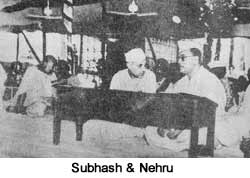

 |  |
 Subhash Bose believed that the Congress was strong enough to launch an immediate struggle and that the masses were ready for such struggle. He was convinced , as he wrote later, 'that the country was internally more ripe for a revolution than ever before and that the coming international crisis would give India an opportunity for achieving her emancipation, which is rare in human history.'
Subhash Bose believed that the Congress was strong enough to launch an immediate struggle and that the masses were ready for such struggle. He was convinced , as he wrote later, 'that the country was internally more ripe for a revolution than ever before and that the coming international crisis would give India an opportunity for achieving her emancipation, which is rare in human history.' He, therefore, argued in his Presidential address in Tripuri for a programme of immediately giving the British Government a six-months ultimatum to grant the national demand of independence and of launching a mass civil disobedience movement if it failed to do so. Gandhiji's perceptions were very different. The internal strife reached its climax at the Tripuri session of the Congress, held from 8 to 12 March 1939. Bose had completely misjudged the faith of Congressmen. They were not willing to reject Gandhiji's leadership or that of other older leaders who decided to bring this home to Subhash. Bose could see no other way but to resign from the Presidentship. Nehru tried to mediate but to no avail. Bose could also not get the support of the Congress Socialists and the Communists at Tripuri or after. Subsequently in May, Subhash and his followers formed the Forward Bloc as a new party within the Congress. And when he gave a call for an all-India protest on 9th July against an AICC resolution, the Working Committee removed him from the Presidentship of the Bengal Provincial Congress Committee and debarring him from holding any Congress office for three years. next page >> |
Copyright ©2000 indiansaga.info. All rights reserved.
By using this service, you accept that you won't copy or use the data given in this website for any commercial purpose.
The material on indiansaga.info is for informational & educational purpose only.
This site is best viewed at 800 X 600 picture resolution.